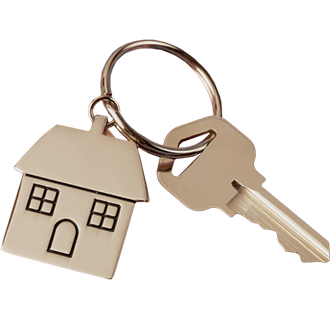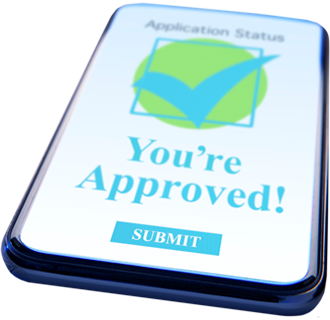We are closed on Monday, September 1, in observance of Labor Day.
Online and mobile banking are available 24/7.

Inquire online, and our mortgage loan experts will get back to you in 1-2 business days.
We offer guidance on diverse mortgage products, ensuring confidence as you navigate the home-buying process. With various home loan financing options, we work with you to help find the right product for your needs. Whether purchasing a new home, vacation property, or refinancing, we can help.
Our consultants will take the guesswork out of which mortgage loan solution is right for you.
A conventional loan isn’t backed or secured by a government agency. It typically comes in several different term options, with the most popular being a 15 or 30-year fixed-rate loan. Whether you're a first-time homebuyer or a homeowner searching for more affordable refinancing options, a conventional loan may be the right fit.
A bridge loan allows you to borrow against the equity of your current home to use as a down payment on your new home. This can be a good option for those who can make mortgage payments on both properties and want access to the equity in the house they are selling.
A take-out loan is a short-term mortgage that allows you to purchase a home before selling your current one.
NIFA loans are designed for first-time home buyers whose income is below certain thresholds. These loans offer competitive interest rates and the potential for no down payment.
HomeReady® loans are designed for homebuyers who are looking for a lower down payment option. Borrowers do not need to be first-time home buyers but do need to meet certain income requirements.
Each year, FHLB makes a specific amount of grant funds available for first-time and non-first-time home buyers who meet specific criteria. These funds can be used for a down payment and/or closing costs.
There are two main types of government loans: Veterans Affairs (VA) and Federal Housing Administration (FHA) loans. VA Loans are government-backed loans that offer highly competitive interest rates with little to no down payment required. FHA loans are guaranteed by the Federal Housing Administration.
A loan attains jumbo status when its mortgage amount surpasses conventional loan-servicing limits. Because of this, you'll need a favorable credit score since you are borrowing above the guaranteed guidelines set by the agencies. With a jumbo loan, the more cash you have for a down payment and the more money you have in reserve, the better. Opting for jumbo mortgages can be beneficial when acquiring primary residences and secondary or vacation homes.



Once you're ready to begin the home loan process, we're here to help keep your loan on track. From pre-qualification to closing—you'll receive exceptional service form the very first conversation. Inquire for a mortgage loan today, it's simple!

Knowing where to start can seem daunting. One of our goals as mortgage officers is to educate you throughout the loan process to help you make informed decisions on the best loan.
One of your first steps should be to schedule a simple, no-obligation discussion with us over a phone call or in person. Here are some typical questions we'll talk through.
This may be one of your initial questions when you start shopping for a new home. There's an easy way to help find the answer: Calculate the size of the monthly mortgage payment, not the size of the house you might purchase. A mortgage loan originator can help with these calculations.
Multiply your gross monthly income by 0.25. Your gross monthly income is the total amount you earn before any taxes or deductions. If you’re purchasing with a spouse or partner, add both of your gross incomes together before multiplying. This equation equals 25% of that income. Most people consider this percentage of gross income comfortable, although each person's situation differs.
Next, update your budget. Imagine that you were paying the amount from step 1 each month. List any debt payments such as student loans, car payments or credit card debt. Also include new expenses you'll have as a homeowner, such as homeowner's insurance, property taxes, maintenance or HOA (homeowners association) expenses.
Did the numbers that you put together work for you? If the monthly payments are too high for your budget, consider finding a less expensive home. If you are comfortable with the numbers or think you can afford more, you can adjust to a more expensive house.
If you want to keep your price range the same, you'll need to consider factors that reduce the size of your loan, reducing your monthly payment. Two factors include:
Buying a home might be your most significant financial decision yet, so making informed choices and paying attention to the details is crucial. With the help of your Loan Originator and Real Estate Agent, the process can be seamless, enjoyable and rewarding.
When considering a home, costs are at the top of your list. One of the most essential costs is the down payment. Here are some things to consider when saving for a down payment so that you can feel confident going into the mortgage process.
A down payment on a mortgage is the upfront payment you make when purchasing a home. It's calculated as a percentage of the total purchase price you pay upfront. The remaining balance is typically financed through a mortgage loan. The money you put down represents your initial investment in your home. Lenders like to make borrowing decisions they feel confident about, and a large down payment helps suggest to them that you're fully committed to the transaction. In return, a lender may offer you a lower mortgage interest rate.
The typical response is that you must pay at least 20% of the purchase price. The truth is that lots of people put down way less than 20%.
Necessary documentation varies from homebuyer to homebuyer and from loan to loan. The following is a list of the most common documentation requirements, though depending on your situation and the loan applied for more, less, or different documents may be requested.
Our goal throughout your home loan process is to keep you informed every step of the way. As things progress, you can expect to hear from us each time your loan reaches one of these key milestones.
Once your offer on a home has been accepted, you will complete a mortgage inquiry to begin the application process. Within three business days of submitting your application, you will receive a disclosure package and a loan estimate, including important loan information, such as the total cost of the loan, the interest rate offered, estimated monthly payments and expected closing costs
Once you have signed the disclosures and we’ve received your intent to proceed, your appraisal will be ordered. The appraiser will schedule a visit to the home, complete the appraisal report and submit all required documentation.
Once all documentation has ben collected, our loan processors will review everything for completion and accuracy, and request any additional paperwork that may be needed.
The underwriter will have finished reviewing the entire loan package to determine whether your loan meets the guidelines for approval. Once approved, the loan will be sent to closing.
It’s time to schedule a closing appointment. At least three business days prior to your appointment, you’ll receive your closing disclosure that will outline your loan terms and how much money you will need to bring to settlement. Once documents have been signed, funds will be distributed and ownership of the property will be transferred from the current owners to you - making the house officially yours!
Use this calculator to determine your monthly payment and amortization schedule.

Empowering your ambitions, let's find the right loan for you. Get the home equity line of credit, home equity, vehicle, or unsecured loan you need.